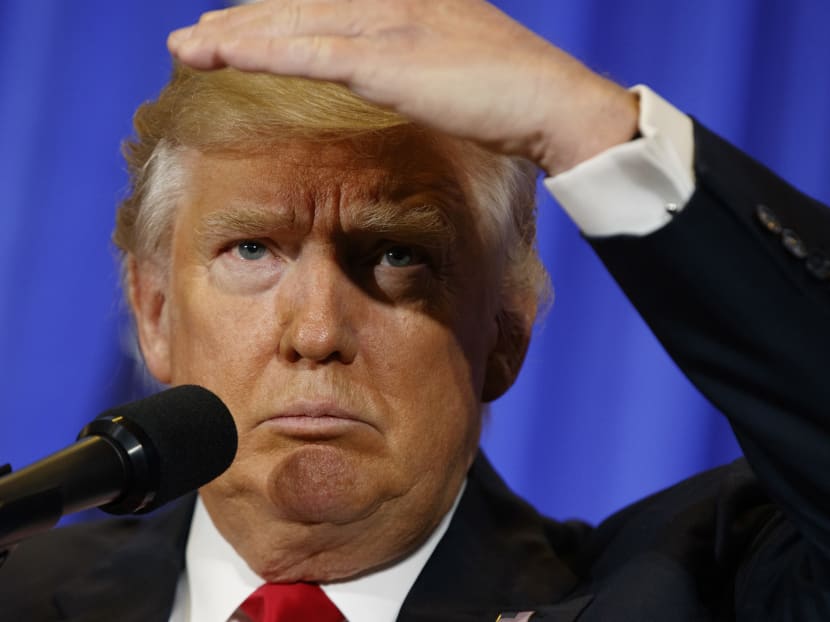One-China policy non-negotiable, Beijing reminds Trump again
BEIJING — China’s Foreign Ministry has again rejected President-elect Donald Trump’s suggestion that he might use American policy on Taiwan as a bargaining chip between the two sides, amid signs the mercurial leader plans to reset Washington-Beijing relations after he takes office.

Donald Trump. AP file photo
BEIJING — China’s Foreign Ministry has again rejected President-elect Donald Trump’s suggestion that he might use American policy on Taiwan as a bargaining chip between the two sides, amid signs the mercurial leader plans to reset Washington-Beijing relations after he takes office.
Chinese Foreign Ministry spokesman Lu Kang stated that the “One China’’ policy is “non-negotiable”.
“The government of the People’s Republic of China is the only legitimate government representing China,’’ said Mr Lu in a statement posted on the Chinese Foreign Ministry website late on Saturday.
“That is the fact acknowledged by the international community and no one can change ... We urge the relevant party in the United States to realise the extreme sensitivity of the Taiwan issue and to respect commitments made by previous American governments (and) avoid undermining the healthy and stable development of bilateral relations.”
Since recognising Beijing in 1979, Washington has maintained only unofficial ties with Taiwan, the self-governing island that Beijing considers its territory — a status quo that Mr Trump has repeatedly threatened to upend since winning the November election.
The President-elect told The Wall Street Journal (WSJ) in an interview published last Friday that “everything is under negotiation, including ‘One China’”.
The interview is the latest indication Mr Trump might shake up the US-China relationship, particularly on Taiwan, which China considers a core national interest.
Beijing was already angered by Mr Trump’s Dec 2 phone call with Taiwanese President Tsai Ing-wen, the first time an American president or president-elect has publicly spoken to a Taiwaness leader in nearly four decades. Beijing considers any reference to a separate Taiwanese head of state to be a grave insult.
Mr Trump had also said in a television interview that he did not feel “bound by a One-China policy unless we make a deal with China having to do with other things, including trade”.
After attacking China repeatedly during his campaign, Mr Trump has continued to disparage China on his Twitter account over its military build-up in disputed areas of the South China Sea, allegedly manipulating its currency to put American companies at a disadvantage, and not doing enough to curb North Korea’s nuclear programme.
Mr Trump told WSJ that he would not label China a currency manipulator as soon as he takes office this Friday, though he repeated his contention that China is manipulating the yuan.
So far, Beijing has reiterated its refusal to negotiate on Taiwan and to push for positive cooperation between the two sides, though state-run media have run several strongly worded editorials attacking Mr Trump.
Mr Trump also defended his controversial call with Ms Tsai in his interview with WSJ. “We sold them (Taiwan) US$2 billion (S$2.85 billion) of military equipment last year. We can sell them US$2 billion of the latest and greatest military equipment but we’re not allowed to accept a phone call,” he said.
Chinese political observers yesterday said they expected Beijing’s response to change once Mr Trump is inaugurated.
“Trump has not taken office yet, so he is an ordinary person now,’’ said Mr Shen Dingli, a professor of international relations at Fudan University. “Therefore, there’s no need for China to take his remarks seriously or further respond to what he said.’’
Professor Tang Yonghong, from Xiamen University, said that China needed to convince Mr Trump that “if he wants to make money from the Chinese mainland, he must be a friend of China instead of being an enemy”.
“I think Trump is handling international relations, including Sino-US relations, with a businessman’s logic,’’ said Prof Tang. “He wants to see how China will respond to such provocation.” AGENCIES





